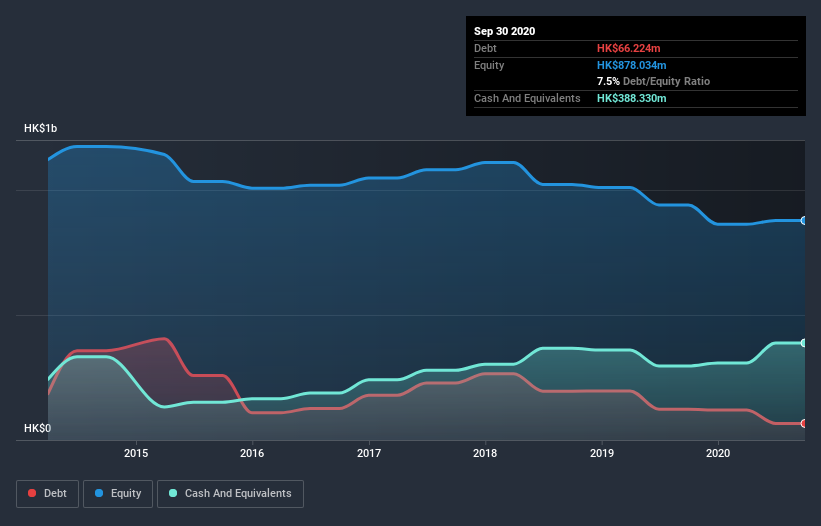
Legendary fund manager Li Lu (who Charlie Munger backed) once said, 'The biggest investment risk is not the volatility of prices, but whether you will suffer a permanent loss of capital.' So it seems the smart money knows that debt - which is usually involved in bankruptcies - is a very important factor, when you assess how risky a company is. We can see that Lee Kee Holdings Limited (HKG:637) does use debt in its business. But is this debt a concern to shareholders?
Why Does Debt Bring Risk?
Generally speaking, debt only becomes a real problem when a company can't easily pay it off, either by raising capital or with its own cash flow. In the worst case scenario, a company can go bankrupt if it cannot pay its creditors. However, a more common (but still painful) scenario is that it has to raise new equity capital at a low price, thus permanently diluting shareholders. Of course, plenty of companies use debt to fund growth, without any negative consequences. The first thing to do when considering how much debt a business uses is to look at its cash and debt together.
See our latest analysis for Lee Kee Holdings
What Is Lee Kee Holdings's Net Debt?
You can click the graphic below for the historical numbers, but it shows that Lee Kee Holdings had HK$66.2m of debt in September 2020, down from HK$123.1m, one year before. However, it does have HK$388.3m in cash offsetting this, leading to net cash of HK$322.1m.

How Strong Is Lee Kee Holdings's Balance Sheet?
The latest balance sheet data shows that Lee Kee Holdings had liabilities of HK$93.1m due within a year, and liabilities of HK$19.2m falling due after that. Offsetting this, it had HK$388.3m in cash and HK$188.7m in receivables that were due within 12 months. So it actually has HK$464.7m more liquid assets than total liabilities.
This luscious liquidity implies that Lee Kee Holdings's balance sheet is sturdy like a giant sequoia tree. On this view, lenders should feel as safe as the beloved of a black-belt karate master. Succinctly put, Lee Kee Holdings boasts net cash, so it's fair to say it does not have a heavy debt load! There's no doubt that we learn most about debt from the balance sheet. But it is Lee Kee Holdings's earnings that will influence how the balance sheet holds up in the future. So when considering debt, it's definitely worth looking at the earnings trend. Click here for an interactive snapshot.
Over 12 months, Lee Kee Holdings made a loss at the EBIT level, and saw its revenue drop to HK$1.7b, which is a fall of 16%. That's not what we would hope to see.
So How Risky Is Lee Kee Holdings?
Although Lee Kee Holdings had an earnings before interest and tax (EBIT) loss over the last twelve months, it generated positive free cash flow of HK$150m. So although it is loss-making, it doesn't seem to have too much near-term balance sheet risk, keeping in mind the net cash. The next few years will be important as the business matures. The balance sheet is clearly the area to focus on when you are analysing debt. But ultimately, every company can contain risks that exist outside of the balance sheet. Case in point: We've spotted 2 warning signs for Lee Kee Holdings you should be aware of, and 1 of them is a bit unpleasant.
When all is said and done, sometimes its easier to focus on companies that don't even need debt. Readers can access a list of growth stocks with zero net debt 100% free, right now.
If you’re looking to trade Lee Kee Holdings, open an account with the lowest-cost* platform trusted by professionals, Interactive Brokers. Their clients from over 200 countries and territories trade stocks, options, futures, forex, bonds and funds worldwide from a single integrated account. Promoted
New: AI Stock Screener & Alerts
Our new AI Stock Screener scans the market every day to uncover opportunities.
• Dividend Powerhouses (3%+ Yield)
• Undervalued Small Caps with Insider Buying
• High growth Tech and AI Companies
Or build your own from over 50 metrics.
This article by Simply Wall St is general in nature. It does not constitute a recommendation to buy or sell any stock, and does not take account of your objectives, or your financial situation. We aim to bring you long-term focused analysis driven by fundamental data. Note that our analysis may not factor in the latest price-sensitive company announcements or qualitative material. Simply Wall St has no position in any stocks mentioned.
*Interactive Brokers Rated Lowest Cost Broker by StockBrokers.com Annual Online Review 2020
Have feedback on this article? Concerned about the content? Get in touch with us directly. Alternatively, email editorial-team (at) simplywallst.com.
About SEHK:637
Lee Kee Holdings
An investment holding company, engages in the trading of non-ferrous metals in Hong Kong and Mainland China.
Flawless balance sheet and slightly overvalued.
Market Insights
Community Narratives



